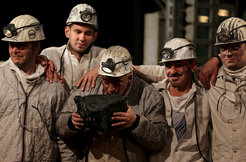The End of Solidarity?
Deindustrialization in Germany and France 1960-2000
Julia Wambach

"The end of solidarity?" is a comparative social history of deindustrialization in Western Europe between 1960 and 2000. Based on oral history interviews in two industrial regions (Northern France, and the German Ruhr valley), it aims at understanding the changing perceptions of political, social, and economic belonging at a moment when the inhabitants of these industrial areas lost the traditional focal point of their identity, namely work in the coal and steel industries. The subsequent changes in the emotional communities were all the more important since the mining and steel regions had traditionally been zones of immigration over the course of the nineteenth and twentieth centuries. The project analyzes the tools that bound people of the regions together once the infrastructure built around communal work in the coal mines and steel factories had vanished.
The study combines three approaches: migration studies, the political economy of deindustrialization, and the history of emotions. Putting these three concepts together can shed new light on the contemporary so-called “migration crisis” in Europe and the emergence of new right-wing parties, which have been able to recruit many voters in the deindustrialized regions of Europe over the past years.
